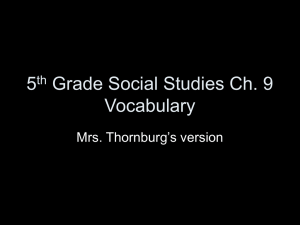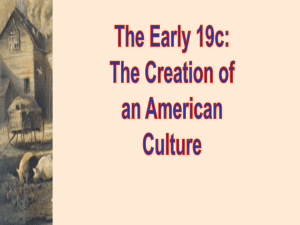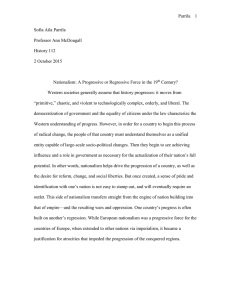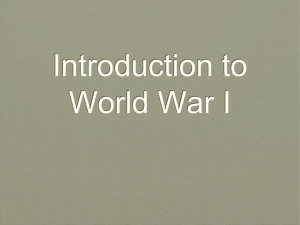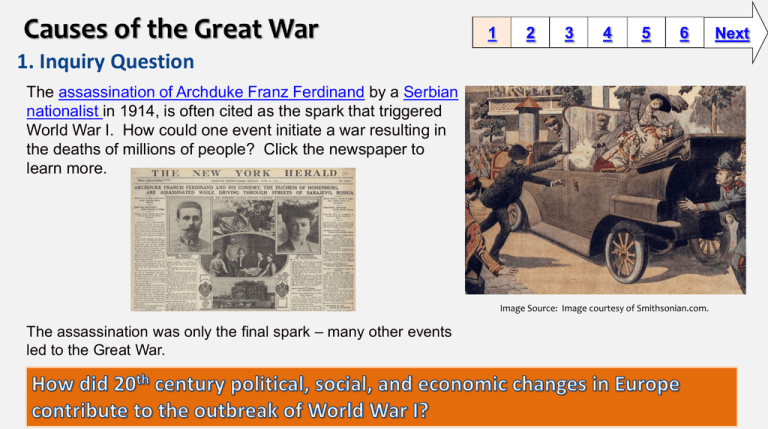
1
2
3
4
5
6
1. Inquiry Question
The assassination of Archduke Franz Ferdinand by a Serbian
nationalist in 1914, is often cited as the spark that triggered
World War I. How could one event initiate a war resulting in
the deaths of millions of people? Click the newspaper to
learn more.
Image Source: Image courtesy of Smithsonian.com.
The assassination was only the final spark – many other events
led to the Great War.
Next
2. Information sources
1
2
3
4
5
6
Next
Analyze the following resources. Using Easy Bib Pro or a note taking
method of your choice, describe the rising tension between
European powers. You will use these notes later to construct
your presentation.
Militarism
Militarism
Background to the War
Alliance System/Arms Race
The Alliance System
The Triple Alliance / The Triple Entente
Background to the War
Imperialism
Imperialism
Imperialism
Nationalism
Nationalism in Europe / Student Resources in Context: Nationalism
Nationalism / Austria-Hungary
Image Source: "Warfare on the Western Front." Online Media.
World Book Advanced. World Book, 2015. Web. 6 Feb. 2015.
*You will need headphones to listen to
the videos on this page.
3. Student Activity
1
2
3
4
5
6
Evaluating resources is important in research. When using sources
outside of the BCPS databases, you need to know whether the
information is accurate and trustworthy, as well as how to properly
cite it.
Find one website on your own that helps you to answer the inquiry
question on Slide 1. “How did 20th century political, social, and
economic changes in Europe contribute to the outbreak of World
War I?”
– Use this evaluation tool to determine whether the site is credible and can be
used in your research paper. If your source fails, it is not suitable for use.
– Print out a copy of your completed form.
– Be thorough in your justification (Narrative Evaluation).
– You must include note cards from your credible source in your research paper
(use the Easy Bib note card resource!)
Next
4. Research Paper
1
2
3
4
5
6
You will now use your research notes to construct a three page
research paper answering the essential question:
How did 20th century political, social, and
economic changes in Europe contribute to the
outbreak of World War I?
Your paper must:
• Answer the essential question by demonstrating the causality
of events
• Be three pages
• Be written in MLA format: double spaced, Times New Roman,
12 pt. font.
• Include a bibliography/works cited page
• Include INTERNAL CITATION. For help on internal citation, visit
the OWL citation guide.
Your research paper will be evaluated using the PARCC rubric.
Image Source: Microsoft Clip Art
Next
5. Enrichment Activities
1
2
3
Examine the following:
Examine the following:
• The Treaty of Versailles
• The effects of the treaty on Germany
• The Rise of Nationalism
• American Nationalism
Using what you know about nationalism
and the causality of events leading to
World War I, write a constructed
response that details the events that
led to the start of World War II. Was
Germany justified in their decision to
start another World War?
Image Source: Student Resources in Context
4
5
6
Answer the following question in a
constructed response.
How does nationalism impact a country? How
does it impact relationships between
countries?
Next
6. Teacher Support Materials
1
2
BCPS Curriculum: Grade 10 World History
C3 Standards
D2.His.1.9-12. Evaluate how historical events and developments were shaped by unique circumstances of time and
place as well as broader historical contexts.
D2.His.13.9-12. Critique the appropriateness of the historical sources used in a secondary interpretation.
Common Core State Standards
Reading: 1. Read closely to determine what the text says explicitly and to make logical inferences from it; cite
specific textual evidence when writing or speaking to support conclusions drawn from the text.
Writing: 7. Conduct short as well as more sustained research projects based on focused questions, demonstrating
understanding of the subject under investigation.
Standards for the 21st Century Learner
1.1.6 Read, view, and listen for information presented in any format (e.g. textual, visual, media, digital) in order to
make inferences and gather meaning.
2.1.3 Use strategies to draw conclusions from information and apply knowledge to curricular areas, real-world
situations, and further investigations.
ISTE NETS - National Educational Technology Standards for Students
3. Research and Information Fluency: Students apply digital tools to gather, evaluate, and use information.
b. Locate, organize, analyze, evaluate, synthesize, and ethically use information from a variety of sources and
media.
4. Critical Thinking, Problem Solving, and Decision Making: Students use critical thinking skills to plan and conduct
research, manage projects, solve problems, and make informed decisions using appropriate digital tools and
resources. c. Collect and analyze data to identify solutions and/or make informed decisions.
3
4
5
6
Time Frame: Two 90 class periods.
Differentiation strategies for this
lesson:
• Direct students to use learning
tools included in our BCPSlicensed databases, such as:
audio read-aloud, labeled
reading levels/Lexiles, and
embedded dictionaries.
• Headphones are required for
portions of this module.
Notes to the teacher:
• Collaborate with your school
library media specialist to
implement this lesson.
• If you’d like to conduct an
evaluation with your students, use
the Crash Course episode 210:
Who Started World War I?
Last updated: July 2015 Created by Eric D. Manko, LMS Loch Raven High School
CONTACT US
BCPS Slam Dunk Research Model, Copyright 2013, Baltimore County Public Schools, MD, all rights reserved. The models may be used for educational, non-profit school use only.
All other uses, transmissions, and duplications are prohibited unless permission is granted expressly. This lesson is based on Jamie McKenzie’s Slam Dunk Lesson module.




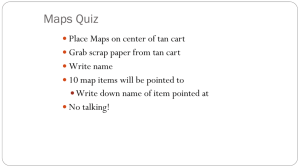
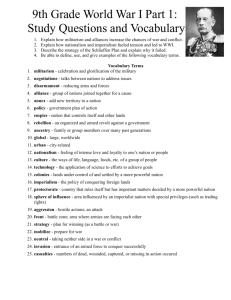
![“The Progress of invention is really a threat [to monarchy]. Whenever](http://s2.studylib.net/store/data/005328855_1-dcf2226918c1b7efad661cb19485529d-300x300.png)
